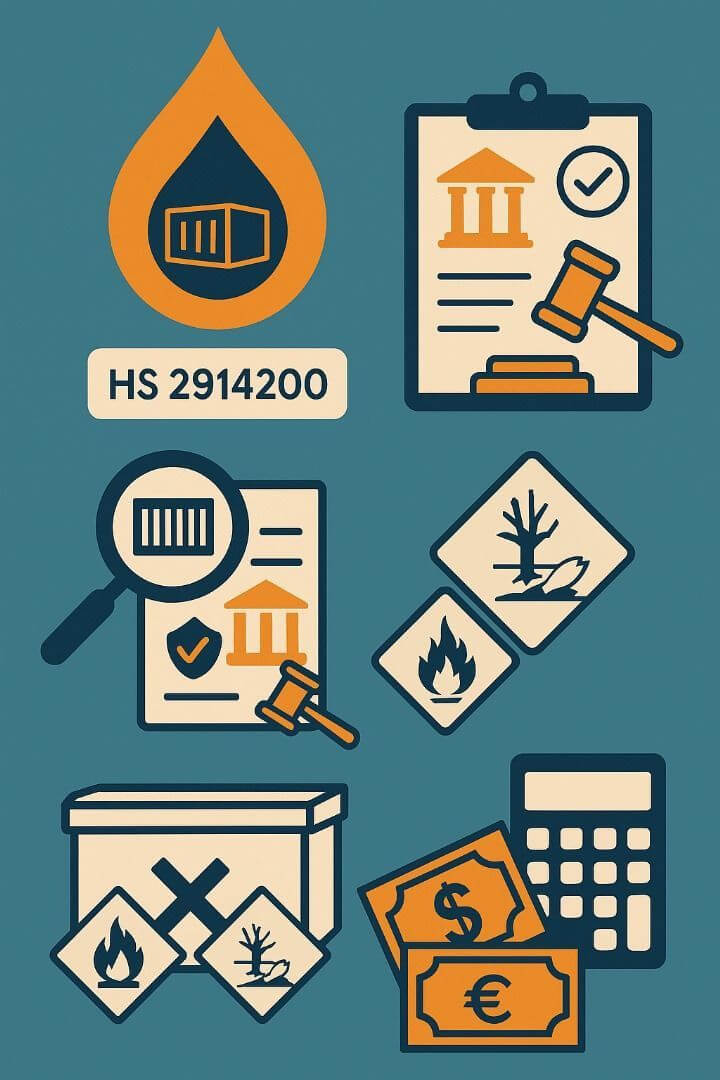Customs Clearance of Methyl Ethyl Ketone Peroxide (MEKP) | Saba Tarkhis

To estimate the time and cost of clearing MEKP, contact the Saba Tarkhis experts.
Instant Free ConsultationSpecialized Applications of MEKP
Fiberglass and composites industry: In fiberglass/composites, MEKP serves as a curing/hardening agent to produce high-strength, lightweight parts. It is vital for aircraft, automotive, and industrial components where strength-to-weight is critical.
Adhesives and industrial chemicals: MEKP is used as a hardener in adhesives, resins, and coatings. Its chemistry enables fast, controlled reactions that enhance manufacturing efficiency.
Key Notes & HS Code for MEKP Clearance
Customs Tariff (HS Code)
| Item | Description | HS Code |
|---|---|---|
| Methyl Ethyl Ketone Peroxide (MEKP) | Organic ketone peroxide; dangerous goods, Class 5.2 | 2909.60 |
Exact subheading may vary based on formulation/stabilizers and origin/destination tariff rules.
Required Documents & Permits
- COA (Certificate of Analysis): Issued by the manufacturer confirming detailed chemistry and composition; must be approved by competent authorities before clearance.
- MSDS/SDS (Material Safety Data Sheet): Full safety profile, handling/storage, transport, and emergency measures for MEKP.
- Dangerous goods transport permits: Mandatory permits per international rules such as IMDG (sea) and ADR (road).
International Transport Standards
Storage & Transport Conditions for MEKP
Specific Conditions for Import/Export of MEKP
Domestic Regulations & Oversight
MEKP Exporting and Importing Countries
Import & Export Volumes of MEKP to/from Iran
Global Circulation of MEKP & Major Importers
Best & Simplest Practices for Clearing MEKP
Complete documentation: Prepare COA, MSDS, and dangerous goods permits thoroughly; submit to customs in advance and obtain approvals.
Obtain relevant permits: Secure permits from the Department of Environment, ISIRI, and the Ministry of Industry, Mine & Trade before arrival. Without them, clearance is not possible.
Technical & safety inspection: Upon arrival, authorities will conduct safety/quality checks to ensure compliant storage/transport conditions.
Specialized safe transport: Choose carriers experienced with dangerous goods, using suitable containers/equipment per international standards.
Documents Required for MEKP Clearance
1) Certificate of Analysis (COA)
Issued by the producer/exporter; details composition and purity, showing compliance with quality standards. Mandatory for customs and other authorities.
2) MSDS/SDS
Provides hazards, safe storage/handling, and emergency actions; serves as the working safety guide and demonstrates importer responsibility.
3) Dangerous goods transport permits
Required per IMDG/ADR (and IATA for air) to ensure compliant carriage.
4) Commercial Invoice
Pricing, quantity, and weight—basis for duty/tax calculation.
5) Packing List
Package counts/weights for inspections and reconciliation.
6) Import permit from the Department of Environment
Confirms environmental compliance.
7) ISIRI compliance/standard permit
Confirms compliance with national safety/quality standards.
8) Bill of Lading (B/L) or Air Waybill (AWB)
Evidence of shipment and title; shows origin, destination, and terms.
9) Certificate of Origin
Indicates producing country; used for tariff assessment and origin determination.
10) Cargo Insurance
Financial protection against transport risks; essential for hazardous goods.
11) Permit from the Ministry of Industry, Mine & Trade
Authorizes lawful import procedures.
Need precise 2909.60 subheading determination and duty/tax estimation? Our team is here to help.
Request a ProformaPractical Tips for MEKP Importers
- Know the approved stabilizers in the formulation; any mismatch with the MSDS triggers sampling and delays.
- State storage conditions on the B/L/transport instructions (temperature control, segregation from incompatibles).
- Apply Class 5.2 hazard labels and dangerous goods marks per IMDG/ADR on every package.
Frequently Asked Questions
What is the HS Code for MEKP?
Typically under Chapter 29, heading 2909.60 (alcohol/ether/ketone peroxides); exact subheading depends on composition and stabilizers.
Which permits are required in Iran to import MEKP?
Permits from the Department of Environment and ISIRI, plus technical documents including COA and MSDS, and dangerous goods transport permits (IMDG/ADR).
What hazard class is MEKP?
It is classified as an organic peroxide (Class 5.2), usually with specific packaging and controlled transport temperature requirements.
How long does MEKP clearance take?
It varies based on document completeness, sampling/testing results, and port workload; accurate documentation reduces clearance time.
Saba’s Specialized Services for Hazardous Chemicals Clearance
Due to the sensitivity of dangerous goods and international rules, MEKP clearance demands high precision and expertise. Saba provides professional, end-to-end services to clear such cargo quickly and safely, including:
- Specialist consulting: Expert guidance on customs rules, international standards, and documentation for dangerous goods.
- Document preparation: We prepare COA, MSDS, and all related permits so you can present a compliant file to customs.
- Fast permitting: Long experience enables swift, smooth approvals from government and supervisory bodies.
- Safe transport: In partnership with specialist carriers, we select optimal modes/packaging and minimize risk.
- Continuous tracking & reporting: We keep you updated to prevent delays or issues.
.png)
